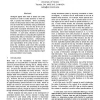Free Online Productivity Tools
i2Speak
i2Symbol
i2OCR
iTex2Img
iWeb2Print
iWeb2Shot
i2Type
iPdf2Split
iPdf2Merge
i2Bopomofo
i2Arabic
i2Style
i2Image
i2PDF
iLatex2Rtf
Sci2ools
106
click to vote
IJCAI
2003
2003
On the Foundations of Expected Expected Utility
Intelligent agents often need to assess user utility functions in order to make decisions on their behalf, or predict their behavior. When uncertainty exists over the precise nature of this utility function, one can model this uncertainty using a distribution over utility functions. This view lies at the core of games with incomplete information and, more recently, several proposals for incremental preference elicitation. In such cases, decisions (or predicted behavior) are based on computing the expected expected utility (EEU) of decisions with respect to the distribution over utility functions. Unfortunately, decisions made under EEU are sensitive to the precise representation of the utility function. We examine the conditions under which EEU provides for sensible decisions by appeal to the foundational axioms of decision theory. We also discuss the impact these conditions have on the enterprise of preference elicitation more broadly.
Related Content
| Added | 31 Oct 2010 |
| Updated | 31 Oct 2010 |
| Type | Conference |
| Year | 2003 |
| Where | IJCAI |
| Authors | Craig Boutilier |
Comments (0)

